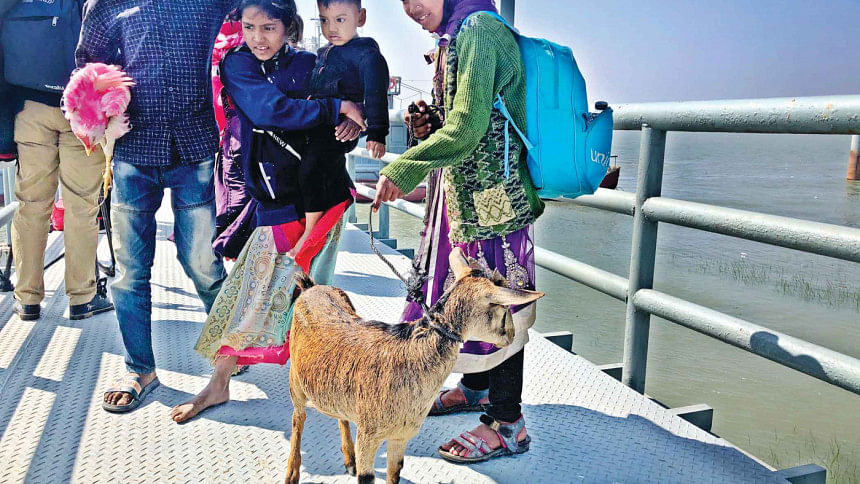Refugee Relocation to Bhasanchar: 1,776 more arrive with new hopes

Shafika and Jhunjhuni are inseparable. Fondly named after Shafika's favourite toy from when she was a toddler, the Black Bengal follows Shafika everywhere.
The two looked very happy as they pranced towards the large playground under the bright morning sun yesterday.
In fact, that was the first thing that Shafika -- and most likely Jhunjhuni too -- noticed, when they reached Bhasan char along with other refugees from the Cox's Bazar camps.
"We did not have anything like this [playground] at the camps. And the roads were hilly," she said, beaming at this correspondent.
Yesterday a total of 1,776 Rohingyas arrived at Bhasan Char in the third batch while another 1,800 are expected to arrive today, said A A Mamun Chowdhury, project director of Ashrayan Project-3.
Initially a total of 1,778 were scheduled to arrive but in the morning one woman went into labour in Chattogram, where they were stayed overnight after arriving from Cox's Bazar.
People with luggage, chickens, ducks, goats, solar panels, food and other belongings arrived at the ships at 9:00am and were given breakfast and lunch during the jouney. The aged were seen being carried on the shoulders of the young.
Four ships arrived at Bhasan char around 12:00 pm.
Rohingya refugees are increasingly showing their desire to move to Bhasan Char from the crammed camps in Cox's Bazar with the hopes of a better future.
"Rohingyas are motivating each other to come here. Those who came to Bhasan Char are satisfied with the facilities they have gotten, and this is inspiring the others to come too," the PD said.
Rafikullah, 50, said his cousin had come here in an earlier batch and told him about the good facilities here.
"Now we have come here. I think our long-standing sufferings will come to an end," he said.
Parvin Aktar said she came to Bhasan Char for the safety and security of her children.
"My kids will get access to education and a good social life. In the Cox's Bazar camp, there was no security for the children," she said.
A mother of three, Yasmin Aktar said she is going voluntarily and to get finally leave behind the life in the camps.
"A section of the Rohingyas tortured others in the camps. They would torture people for money by locking them in the toilets or whipping them," she said while speaking of the sufferings they had to endure.
"When the sun would set, it would be dreadful for the women in the camps. We would not be able to move around. Women are highly unsafe in the camps," she added.
After their arrival at Bhasan Char, they were taken to an empty warehouse where they offering prayers of gratitude for their safe journey to the island. They were then shifted to their homes.
The first batch, with 1,642 Rohingyas, was relocated to Bhasan Char on December 4. Over 1,800 others were relocated on December 29.
The Bangladesh Navy has undertaken the Tk 3,100 crore project, titled Ashrayan-3 Project, on the island to provide shelter to the refugees.
On the Char, the buildings are equipped with electricity, solar panels, biogas plants, and mobile networks.
The houses have been built four feet above the ground with concrete blocks. Each building will house 16 families of four in its 16 rooms, providing more than the UN stipulated 37 square feet per person, project officials said.
The United Nations and other development partners, however, expressed concerns and demanded independent assessments of the project before the relocation.
The UN and rights groups have been questioning the relocation plan, saying the island was prone to floods and could be submerged during high tides.

 For all latest news, follow The Daily Star's Google News channel.
For all latest news, follow The Daily Star's Google News channel. 



Comments